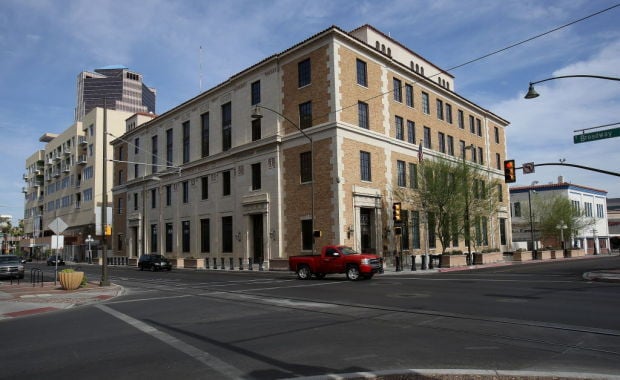Bankruptcy filings increased in 2023 across Tucson, the state and the nation, as the effect of federal COVID-19 stimulus funding waned and households and businesses were stressed by inflation and higher interest rates.
But the number of new bankruptcies remained far below pre-pandemic highs nationally, and Arizona saw its case filings grow at just half the national pace, according to the latest data from the U.S. Bankruptcy Court.
Overall bankruptcy case filings filed in the court’s Tucson office were up 9.2% in 2023, with 2,419 filings of all types, while statewide filings were up 7.2% with 9,601 cases.
The increase in overall filings in Arizona in 2023 came after a three-year decline since 2019, when nearly 17,000 cases were filed in the state.
Nationally, total bankruptcy filings rose 18% in 2023 to 445,186 cases, with Chapter 11 cases — filed mainly by businesses to shield them from legal action while they work out a plan to repay creditors — jumping 72%, according to a report by the research firm Epiq for the American Bankruptcy Institute or ABI.
While showing a substantial year-over-year increase, total U.S. bankruptcy filings remain far lower than the pre-pandemic total of 757,816 filed in 2019, according to the ABI-Epiq report.
“Though still below pre-pandemic figures, bankruptcies in all filing categories climbed last year amid the evaporation of pandemic emergency responses, increased interest rates and tougher lending standards,” ABI Executive Director Amy Quackenboss said.
Stressed consumers
The growing financial stress on households also is showing up in increases in two types of filings primarily or mainly made by individuals seeking to escape the crush of debt.
Filings under Chapter 7 of the bankruptcy code, which are filed mainly by individuals and result in the liquidation of a debtor’s assets to pay off debts, were up 7.2% statewide last year and in Tucson, such filings rose 8%, to 1,939 cases.
All but 23 of the Chapter 7 cases were filed by individuals in the Tucson court office, which besides Pima County handles bankruptcy filings from Cochise, Graham, Greenlee, Pinal and Santa Cruz counties.
Filings under Chapter 13, which allows individuals to make a plan to pay off debts below certain thresholds, rose 7.2% statewide and 14.7% in Tucson.
Nationally, overall consumer filings last year were up 18% from 2022, at 419,559, with Chapter 7 filings increasing 17% and Chapter 13s up 18%, according to the ABI-Epiq report.
Michael Hunter, vice president of Epiq’s AACER bankruptcy data service, said the firm expected bankruptcy filings to increase and that business filers would lead a move back to pre-pandemic filing levels.
Hunter cited the runoff of pandemic stimulus funds, increased cost of funds, higher interest rates, rising delinquency rates and “near historic” levels of household debt.
University of Arizona economist George Hammond said the loss of federal support and higher costs particularly for housing may be spurring more consumer bankruptcies, though Arizona’s economy remains on a solid footing.
“(With) the loss of the federal pandemic income support, which happened in 2022, and then households are running down their savings, I think we’re starting to get towards the end of that process and people are kind of finding themselves up against a hard place,” said Hammond, adding that big increases in rents and home prices and higher interest rates are pressuring household budgets.
Business filings flat
While Chapter 11 business filings surged nationally last year, Arizona bankruptcy filings under Chapter 11 were virtually flat last year, with 104 filings compared with 103 in 2022, and 86 filed by business debtors each year.
Overall Chapter 11 filings in the Tucson office rose to 20 last year from 19 in 2022, but business filings fell to 15 last year from 17 in 2022, with the overall increase attributable to an increase in individual Chapter 11 cases.
Individuals typically file for Chapter 11 when they don’t want to liquidate under Chapter 7 but their debts exceed allowable thresholds for a Chapter 13 filing.
Hammond said a few high-profile bank failures last year prompted fears of a wider banking collapse that would limit access to business financing and create a domino effect of business failures.
That hasn’t happened — at least not yet, he said.
“We all thought that was going to be a big deal with those bank failures and that credit is really going to dry up for everybody and banks are going to retrench, and it doesn’t seem like that really happened very much,” he said, adding that things could change as banks sort out their balance sheets.
Among the Chapter 11 filings last year in the Tucson area were Casa CBW LLC, operator of Casa Marana restaurant and bar in Marana, which filed in early February and has remained in operation as its reorganization plan was confirmed by the court in September.
Other local Chapter 11 filers included Innovative Concepts Empire Inc., which operates Fuku Sushi at Main Gate Square on the University of Arizona campus and filed last May. The restaurant remains in operation as it awaits approval of its reorganization plan.
Cactusrv.com, which operates a recreational-vehicle dealership on North Romero Road, filed for Chapter 11 in September and also has remained in business pending confirmation of its reorganization plan.
Meanwhile, Tucson-based biotech startup HTG Molecular Diagnostics filed for Chapter 11 bankruptcy reorganization last June in its corporate domicile of Delaware, listing assets totaling about $6.7 million and debts of about $9 million.
But the company, which has developed proprietary genomic profiling systems to speed up discovery of new drugs, hasn’t filed a reorganization plan and its Silicon Valley Bank, the company’s main secured creditor owed $2.7 million, has objected to HTG’s reorganization.
The bank, which after failing in March 2023 is now part of First Citizens BancShares, successfully moved to appoint a bankruptcy trustee for HTG to oversee the business in July, citing a lack of any new financing.
In November, the trustee won court approval to hire a firm to market HTG’s patents and other intellectual property.





